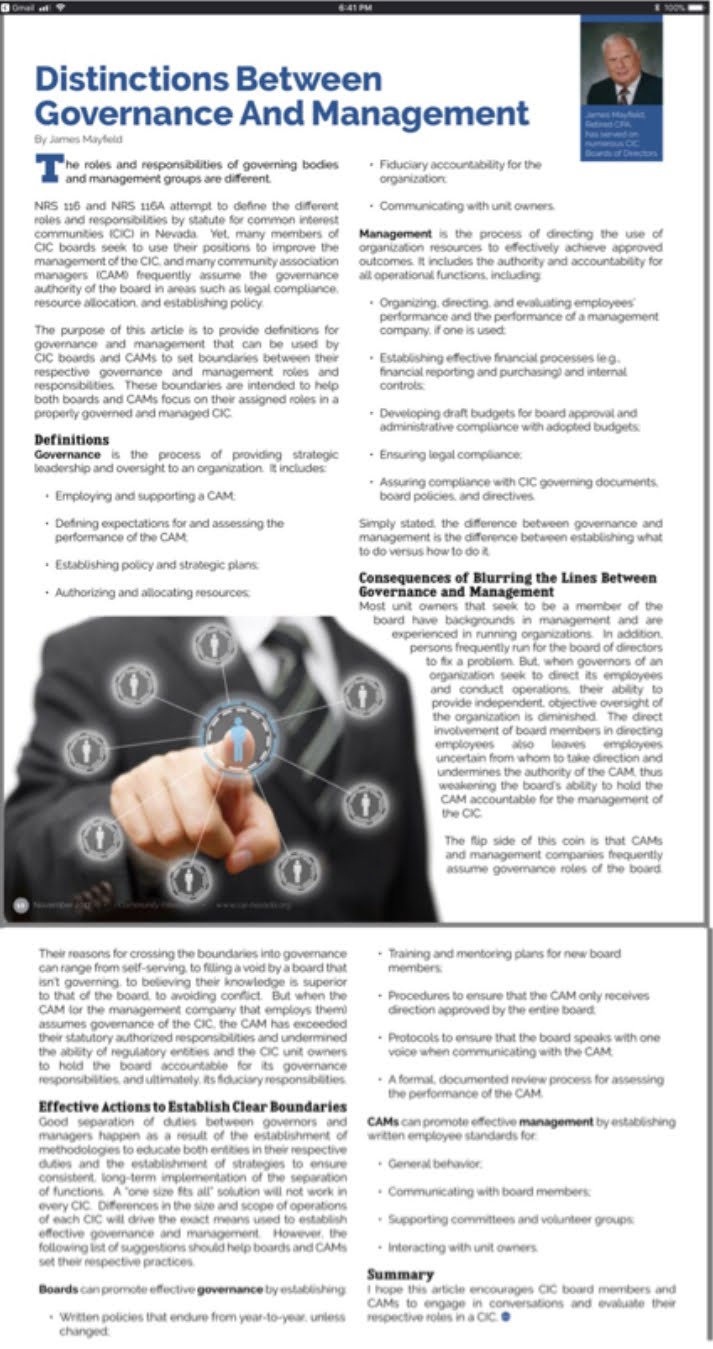And what owners can do to make it that way
Taking a cue from Jim Mayfield’s article “Distinctions between Governance and Management” re-published below, here are a few action items.
In italics: how I see things are currently being done around here.
- Encourage owners to run for the Board who are willing to contribute to creating more transparent, competent and accountable governance, or volunteer to serve yourself.
There is a battle for control of the Board between those who want a fair and open system created that’s good for all owners vs. those in power who want to keep centralized control by excluding anyone who has complained about this GM or who signed a recall petition. - Utilize the expertise of residents on a Personnel Committee to protect SCA against employer liability, to propose GM performance standards using customer ratings and objective measures to prevent excessive executive compensation.
These functions currently are done, if at all, by 1-2 Board members who don’t have the requisite skills, and the Board and GM have acted unlawfully to block necessary owner oversight. - Require the GM to utilize an inclusive process and resident expertise to recommend goals and strategic plans to bring SCA back to be #1 Active Adult Community in USA.
SCA had this #1 rating in 2011, but has slipped, and we currently have no adopted goals or shared vision about how to get SCA back on top. Instead, the Board abdicates to a GM who has not evidenced any strategic approach to lessening owner dissatisfactions or community divisions. - Demand that governance be completely transparent to owners.
Right now, the Board pays lip service to improving owner communications, but allows the GM to use the attorney to conceal SCA records for reasons other than serving the best interests of the association. This secrecy allows SCA owners to be put at risk of being bilked by SCA agents, and it inhibits the SCA Board from being held fully accountable for its duty of care to owners. - Get control of the budget out of the hands of the GM. Although the law prohibits the Board from delegating policy decisions about the budget and prohibits the GM from expending funds for unbudgeted purposes, the blurring of the lines of authority regularly occurs, and owners just have to pay the bill.
Former Director thinks SCA Board chose wrong path
Jim Mayfield served six years as an independent voice on the SCA Board. His experience with fractured governance in the last couple of years had some interesting parallels to what I suffered during my short tenure:
- President, GM, and attorney exerting excessive self-interested power;
- Board rejecting any owner oversight and
- punishing owners or individual Board members who complained.
Jim’s comments in his article, published in the November issue of the Community Association Institute magazine is re-published here with his permission. – Nona
“Two and a half years ago, the Board was offered a clear choice between two forms of governance.One form was the legal model embedded in NRS 116 and approved by CAI. This form is based upon a model in which all elected Board members are considered equals and participate in a transparent, collaborative relationship, and the President (CEO) is directed by the Board and speaks only for the Board. It also establishes the major responsibility is to protect homeowner rights and to establish processes for oversight of management. This is the model described in the above article that was published in November.The second form is a dictatorship that empowers the President (CEO) to exercise dictatorial powers, makes decisions, imposes his/her decisions on the Board (the Board reports to the President). This model sees its primary responsibility to represent and protect management from the homeowners. The model also expands the ability of the President, Board, and GM to operate in secret meetings and to empower its attorneys to use legal process to accomplish its objectives and those of the GM.SCA is now reaping the fruits of this decision. I hope all persons thinking about running for the Board in 2018 will read the article and commit to the principles outline therein.” -Jim Mayfield (see Page 10 in link below.)

Comments are closed.